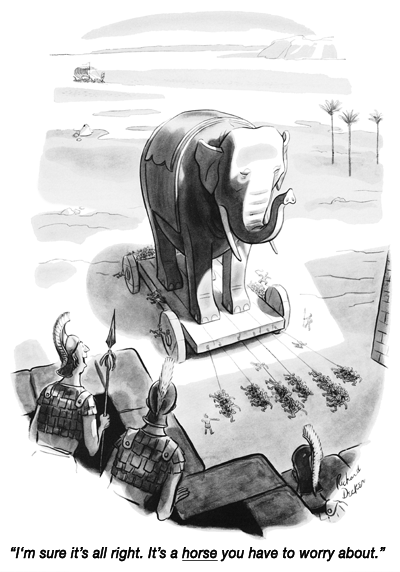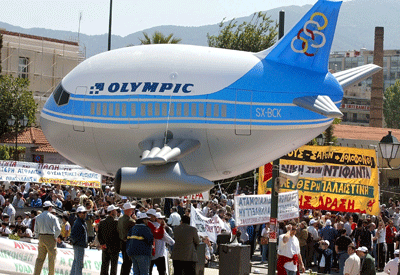
Timeo, danaos, et dona ferentes is a Latin phrase from the writings of Virgil; it literally means "Fear the Danaans—the Greek—even when they bear gifts."
In fact, it is a warning made to the citizens of Troja who brought in the wooden Trojan horse they thought was a donation to the Gods. The rest of the story is legend—Ulysses, accompanied by other Greek heroes, climbed out from a hiding place in the horse’s womb to fall upon the defenseless city at night, thus ending the 10-year Trojan War. 
It may indeed be appropriate to remember this piece of history-cum-mythology when taking a look at the state of the Greek economy, the Greek society, and the Greek aviation sector.
“Cables from Greece” may sound slightly like a throwback in the Facebook age, but what the world loves about an enchanted place like Greece is the depth of their history. So what can or should Grecians do about the state they are in in 2015?
What is fact and what is myth largely depends upon whether you are Greek or not, and the recap of negotiations regarding European financial assistance told by Giannis Varoufakis (former Greek minister of Finance) bears very little resemblance to the recap given by Wolfgang Schäuble (German Minister of Finance).
But a September report stating that Germany profited from the Greek crises flies in the face of the popular notion that Europe’s largest economy unfairly bore the brunt of Greece’s financial troubles.
For the record, the study was conducted by a leading German think-tank, The Halle Institute for Economic Research (IWH).
“Germany benefited significantly from the European/Greek debt crises,” the report stated.
“Bad news in Greece was good news for Germany and visa-versa.”
These days, it might be better for Greeks to paraphrase their old warning with “Beware of Germans even when they bear gifts,”—it might be fitting to remember that the German word “Gift” (with a capital G) means “poison.” Although Greece has been “rescued” another time and financial help was made available, there is no resolve and no help.
The Greek state continues to be crippled by its mountain of state debt, currently at about 317 billion Euros (US$346 billion) and its inability to service these debts and refinance itself on the international markets.
Probably the biggest difference between Europe and the U.S. is that the U.S. is one country consisting of 50 states, trying to impose as little governmental measures on its citizens as possible, while the European Union is a loose group of currently 28 member states. Although the Maastricht and Lisbon Treaties covering accession to the EU and the obligations and rights of each member state were not meant to intrude on the area of national sovereignty or limit a national government’s right to make autonomous democratic decisions, in practice the EC regulations have invaded the life of each European citizen.
The “common market without borders and taxes” also means that legislations and the tools of governance had to be harmonized, which means financially weaker states dependent on the EU must use available financial subsidies to adapt to the standards and demands of the financially stronger states—namely the Germans, who are still Europe’s strongest economy.
Olympic Airways (OA) was formerly the proud flag carrier of Greece. Headquartered in Athens, it possessed a tight-woven domestic network of 37 destinations and served up to 38 international destinations, focusing on the Middle East, Europe, and North America.
After shipping tycoon Aristoteles Onassis bought into OA in 1956, the fleet quickly modernized, introducing the first Boeing 707-300 in 1965 and the 747-200 in 1972.
In January 1973 Alexander Onassis, the son of the shipping tycoon, perished in an aircraft accident and subsequently Onassis sold his shares in OA.
It is safe to say that the then state-run OA (whose domestic services had been outsourced to an offshoot called Olympic Aviation) was not well managed. Nevertheless, OA was providing good services and employed up to 8,500 staff (December 2007).
Because of mounting debts which made acquisition of new aircraft difficult if not impossible, OA was sold in March 2009 to a Greek investment fund, Marfin Group. This sale included ground handling, flight operations, and the sizable MRO business.
As the European Commission had ruled the monies allocated to the operations of OA a “market-distorting” and thus illegal aid, OA was forced to shut down on September 29th, 2009. It operated—using the temporary code OP—some remaining flights to Greek Islands until the Greek government reallocated the entire domestic and non-EU international traffic rights to other carriers by means of public tenders. On December 31st, 2009, Olympic Airlines ceased all operations, and the revenues formerly generated by OA were now due to other European Carriers who were able to operate without a need for traffic rights.
Although OA by and large had been lossmaking after the Onassis era, mainly because of poor management, these losses were at least partially incurred because OA’s tight domestic network spanning the popular Greek islands was rather a public service obligation and not an option to generate revenues per se. Still, OA’s contribution to the Greek tourism sector was of enormous importance and by closing down OA, the Greek government lost both tax income, revenues, and influence on a core economic factor.
A buzzword every student of business administration learns in his first semester is “sustainable.” Although much talk has been made about “helping Greece” and making the Greek economy “sustainable,” with friends like the other EU members Greece does not need enemies; none of the obligations imposed on the Greek state in exchange for further financial concessions of the EU Eurozone members is helping the Greek economy to achieve sustainability. To date, a majority of the Greek population does not have access to a working healthcare system or health insurance, and one concession the Greek government, under MP Alexis Tsipras, had to make in the last round of negotiations in early July was to agree to mass layoffs at government-run enterprises. Likewise, although privatization of the 14 Greek domestic airports certainly makes sense, especially when the suitor is Germany’s FRAPORT, whose expertise in operating airports is unparalleled, it is questionable whether such a measure should take place at a time where property values have been diminished as the result of a decade-long state crisis.
Last but not least, even though the “Euro-Partners” (as the EU states like to call themselves) made it a prerequisite for further help that the International Monetary Fund would be a part of the Greek bailout and assistance packet, it was the same IMF which had previously demanded a “haircut,” e.g. a waiver of the Greek debts in the creditor’s books, as the Greek state debt “was too excessive to ever be repaid in the foreseeable future.”
Instead, emergency assistance to Greek banks and further stretching of the Greek debts was agreed upon, in exchange for a considerable raise in VAT (value-added tax), property tax, and forming a trust tasked with the privatization of the Greek state-owned enterprises. The envisioned price of 50 billion Euros (US$54.45 billion) must be called nothing short of fantastic, but the Germans had likewise discouraging experiences. The “Treuhand” was a state-run trust tasked with selling off former state-owned property in formerly communist Eastern Germany after the German reunion was created in June 1990; it oversaw the privatization of roughly 8,500 state-owned enterprises employing about 4.2 million employees.
Until the turn of the century, 2.7 million people formerly employed had been laid off and although considerable properties had been sold, the Treuhand had amassed 295 billion DM (US$160.6 billion) in debt where initial plans had called for earnings of 150 billion DM (US$81.6 billion).
As for the German demands of “budgetary discipline” aimed at Greece, it must be said Greece (among other states) waived the state debt of the Germans resulting from WWII at the 1953 London debt conference, thus making the Wirtschaftswunder possible.
AUTHOR???



